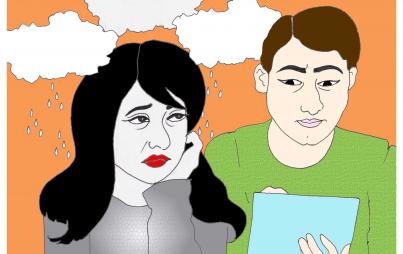
I don’t feel as helpless as I once did. Image: Eli DeFaria/Unsplash
Knowing my triggers and understanding my mood patterns hasn’t cured me, but it has given me the clarity and the information I need to do something about my depression.
Content notice: suicidal thoughts, blood
I was already an hour late for work when I called my boss to tell her I wouldn’t be in for the rest of the week.
When she asked me what was wrong, I lied and told her that my mom died.
Even though I’d been estranged from my mom for more than a decade (and honestly didn't know if she was dead or alive) and I knew that the lie was wrong, I was too worn out to care. Besides, it was a hell of lot easier than telling my boss the truth.
In reality, I was too depressed to lift my head off of my pillow, let alone to get myself to shower, get dressed, brush my teeth, and function at work.
Looking back, I now know that I was clinically depressed and had been for longer than I realized. It started in elementary school when, for no reason, I’d sit and stare at the one white wall in my bedroom and cry for hours.
Then, in high school, where I numbed my feelings by gorging on bags of Cheetos and quarts of mint chocolate chip ice cream.
All the way through college — when my need for relief from the emotional pain trumped my desire to live and I planned my first suicide attempt.
It wasn’t until my mid 20s that I entered therapy and started to untangle the Gordian knot of my mental health. Therapy helped me tremendously, and medication did too.
But I know that the success I have today wouldn’t be possible without the following four tools I regularly use to manage my depression.
With May being National Mental Health Awareness Month, this is the perfect time to share what I’ve learned.
1. I give depression the same respect I give a physical wound.
During a field hockey game in my senior year of high school, I got smashed in the face with a hockey ball. I was left with a skull-exposing gash right through the center of my left eyebrow.
As I fell to the ground and blood poured from my face, my coach ran over and wrapped my head up in a white t-shirt while one of the hockey moms pulled her car up to the field and whisked me off to the nearest emergency room.
Within two hours my wound was cleaned out and stitched up. The doctor did such a fantastic job with the stitches that you can barely see the scar on my face today.
Clearly, I was lucky to be around such proactive and caring people.
But what might have happened if I had let the wound go unattended?
Without the proper care, my gash would’ve easily become infected, leaving the perfect space for gangrene or even cellulitis to develop.
Like a physical wound, depression can be fatal if left untreated. According to suicide.org, the majority of people who die by suicide suffer from mental illness — and that illness is typically depression.
Through the years, I’ve learned to give depression, an emotional wound, the same attention and respect I give my physical wounds.
As a result, I don’t feel as helpless as I once did.
I remind myself that just like a flesh wound or a broken leg, if I give whatever I’m feeling the same respect, the episode will pass. The wound will heal.
2. I enlist the help of a silent witness.
The last thing I need when I’m depressed is someone trying to talk or shame me out of it. No matter how well-intended people may be, it doesn’t help to hear that I shouldn’t be depressed because I “have so much to be grateful for” or that “there’s someone out there worse off” than I.
I get all of that. I know that there are people that don’t have Internet, a roof over their head, or running water. I know that my life is beautiful, and yes, I’m well aware that I have plenty to be grateful for. But it doesn't change my brain chemistry.
Which is why, when I’m depressed, I much prefer the company of a silent witness.
There was a Saturday night a few years ago when a friend invited me over for a quiet night in. After I forced myself out of bed and arrived at her apartment, I told her that I was having a rough couple of days.
Instead of trying to fix me, she just let me be.
While I curled up on her couch feeling numb, defeated and incapable of conversation, she sat right there next to me, sipping a glass of red wine and watching reruns of The Office.
Strangely, I didn’t feel judged or neglected. Instead, I felt understood.
Eventually, I fell asleep on her couch, and woke up the next day feeling much better.
A silent witness doesn’t even have to be another human being — it can be your favorite four-legged friend. The other day, I found this article that talks about the various ways that a pet, just like a silent witness, can help soothe the pain of depression.
3. I track my mood.
Just as I keep track of work deadlines and dentist appointments, I also keep track of my mood on my calendar.
Of all the tools I use to manage depression, my calendar is by far my favorite.
Why? Because, over time, it’s provided me with the most accurate snapshot of my mental health.
Before I started using my calendar, I had no idea that my mood dipped right before and after I got my period. I didn’t know that a few days of rainy, gray weather could trigger a mood swing, and I was clueless that skipping the gym for more than a few days could throw me and my mood way off-balance.
Knowing my triggers and understanding my mood patterns hasn’t cured me, but it has given me the clarity and the information I need to do something about my depression.
4. I Keep It Simple.
When it comes to managing depression, Keeping It Simple is a rule that I always follow.
That means, when I’m depressed, instead of forcing myself to get to the grocery store that’s 20 minutes away, I opt for the one that’s five minutes away. Instead of making dinner, I order in. And instead of cleaning my entire apartment, I commit to just making my bed that day.
Keeping It Simple when I’m feeling a bit funky helps me conserve my emotional and mental resources.
As a result, I can focus on what I need to do to feel better without adding on any additional stress or overwhelm.
♦ ♦ ♦
Before writing this, I was too embarrassed and ashamed to cop to the lie I told my boss.
But now I see the entire situation differently.
Although I knew that lying was wrong, it was the best I could do to manage what made me feel so helpless and out of control at the time.
Thankfully, today, I’ve got tools that make lying unnecessary and living with depression possible.







